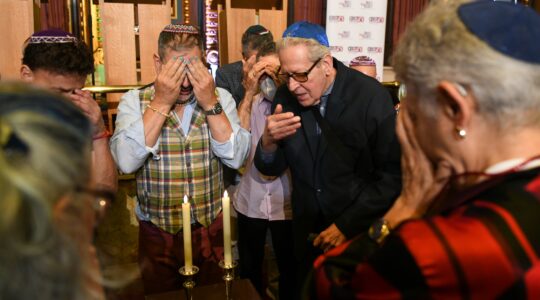Awe – a concept that is so hard to grasp. There are not many things that produce in us a pure sense of awe. If you are like me, you may use the word “Awesome” in your daily speech, but rarely with a true feeling of something being full of awe. Awe seems to contain within it something….majestic….holy….and even fearsome. I think the key to this season, and the place it holds in so many of our lives, lies in this word: Awe.
The reason that so many of us are drawn back to the synagogue, and back to our heritage, no matter where we’ve been the rest of the year, has something to do with this perception of awe. And we should feel a sense of wonder….some amount of trepidation….maybe even a bit of dread, at this time of year.
Why?
Because this time of year, more than any other, holds within in the VERY REAL possibility of change. Making a deep, meaningful change in our lives is terrifying, and we aren’t often ready to make the leap that it requires. But, what if this is the year – what if this is the time – to finally make that change that we have wanted for so long – to bring about that difference in our lives that might just take our souls, our beings, our existences – to the next level?
We face judgment – not just from God, but even more dramatically, from ourselves. We are given the space, every single year, to examine ourselves, to ponder the directions of our lives, and maybe even to shift course. But how do we this? Where do we begin? I believe that we come back to acknowledge the possibility of change. To encounter it, to stand at the precipice, and to face our truest potential.
We are taught, in our tradition, about the Book of Life. We are told to imagine that God has a very large book, and in it are written all of our names. During this season, God takes out a very large pen – or perhaps a pencil, or even a quill as I imagined it as a child and writes our names. “On Rosh Hashanah it is written,” the prayers tell us. Though our “fate” is presumably written down on Rosh Hashanah, we remember that we have until Yom Kippur before the Book of Life is sealed. That gives us ten days to change.
Now, I don’t believe that God actually has a big book up there, almost like Santa Claus, and God determines whether we’ve been naughty or nice. Instead, I see the image of the Book of Life as a powerful metaphor – a stirring reminder of the very real ramifications of many of our actions. The things we do, the ways we act, all have consequences, and can affect or alter the quality of our lives.
After the machzor text reminds us about the Book of Life, we are then given important information: Teshuvah, Tefilah, and Tzedakah – Prayer, Repentance, and Charity – temper judgment’s severe decree.
So, let’s think some more about prayer – the act we do so much of at this time of year. Tefilah is the Hebrew word for prayer. A b’rachah is an individual blessing, but Tefilah is the overall concept of prayer. All Hebrew words have a root word within them that gives us more clues as to their meaning. The root word of Tefilah is palel – which means “to judge.” But the verb of to pray is “l’hitpalel” – a verb construct that is reflexive – meaning you do it to yourself. Thus, to pray in Hebrew is l’hitpalel, and thus to judge yourself. In this sense, prayer is not something you do to God. It is something that you do to yourself.
It’s all too easy to disconnect from the divine soul that dwells within each and every one of us. We can get too bogged down in minutiae, in work, in our anxieties. Prayer gives us a chance to refocus our minds back on what is important – the immortal, holy soul that is in us and in all those around us.
Reconnecting with our souls is crucial – it allows us to check in with ourselves on a very deep, very real level. There is a wisdom inside of us that knows whether or not we are on the right path. It knows if we are being the best person that we can personally be. Have we reached our potential? Have we used all of our blessings to make our lives, and the lives of those around us, even better? It can be terrifying to examine our lives – it can feel like we are opening Pandora’s box, and it would be so much simpler if we could just leave it closed and go along with our lives on a safe, superficial level.
But God wants more from us. Most of us don’t like change. It may be that we are comfortable where we are, happy with our lives, and not interested in doing anything different. Others may see the need for change, but lack the courage to take the first steps. Prayer, almost like a meditation, gives us the space to imagine the change.
We have quiet time, surrounded by a sea of people in the sanctuary, but we are also isolated individuals, deep in our own contemplation and thought. We might ask ourselves questions – “How am I doing? Am I stuck? Is there more I can be?”
There is a story about Reb Zussya, who was sitting and studying the Talmud. Reb Zussya’s students once looked over his shoulders and saw him studying a certain page of the Gemara. The next day, they saw their rabbi was studying the identical page. The following week, they saw him on the same page still! It bothered them and they finally questioned him. “How come you are on the same page?!” To which Reb Zussya responded, “It feels so good here, why should I go elsewhere?”
The Days of Awe are meant to disturb us, to disrupt our routines. To show us that, though it might feel “good here,” or that it might be easier just to maintain the status quo, we must avoid closing ourselves off to new challenges, opportunities, or lessons to learn. No matter our age, there is always more to learn, and there are always ways to improve.
May you all be inscribed and sealed in the Book of Life for a good 5773!
The New York Jewish Week brings you the stories behind the headlines, keeping you connected to Jewish life in New York. Help sustain the reporting you trust by donating today.




